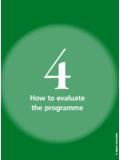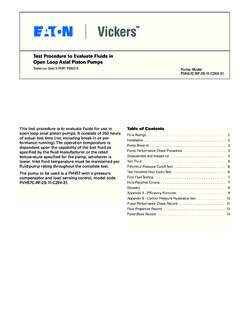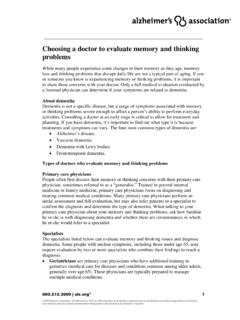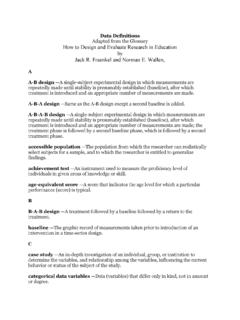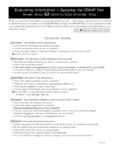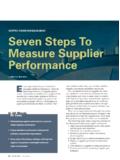Transcription of Evaluate Your Meetings Effectiveness
1 Evaluate your Meetings Effectiveness By Bob Rue, MS Principal Myers Rue Training and Consulting Meetings , Meetings , and more Meetings ! It seems that our only job anymore is to sit through Meetings ! complained a member of my client s team. His complaint is not unique. Many of us are spending more time in Meetings and less time doing real work. Yet, the role of supervisors, middle managers, and executives in organizations that are flattening their structures and creating greater inclusion is increasingly that of a coordinator rather than a producer of goods or services. Without this continuous coordination, a flatter, horizontally integrated organization simply cannot function.
2 Hence, coordination Meetings are a major part of the job for many of us. I usually try to determine the specific objection whenever someone complains about attending too many Meetings . The answer is almost universal, I hate Meetings that waste my time! meeting leaders (those who convene the meeting ) rarely intend to waste the time of their associates. Yet, the perception is all too common that most Meetings are ineffective and a waste. Clearly, the perceived value of the return in attending Meetings isn t worth the investment of time for many participants. I suggest a simple, easy to administer evaluation tool to assist you as a meeting leader in improving the quality of your Meetings whatever their size from small unit Meetings , to more formal and larger customer Meetings , all the way to board Meetings .
3 This tool will help you Meetings be more productive to all who attend minimizing participant dissatisfaction with you as meeting leader. Why Measure meeting Effectiveness ? Many years ago when I entered the work force as a young account executive in the corporate insurance industry, I worked on a small team for eighteen months handling our firm s largest account. During that time, I reported to a senior vice president who held periodic Meetings with his immediate staff. Five of us would huddle in his conference room weekly and listen to him tick off the items he wished to cover on his agenda (which we never saw prior to the meeting , much less contributed to building).
4 His habit was to discuss an issue that concerned him, identify the problem, and tell us his solution. Our job seemed to be to nod in agreement (whether or not we understood the issue). He regularly failed to designate WHO would be given responsibility for doing the tasks required of the solution. As a result, everyone walked away hoping our boss (or anyone else) would take responsibility to do the actual tasks. Therefore, tasks either remained undone or the lowest person in the unit hierarchy would be given the job at the last minute in a desperate move to avoid a group lecture from our boss at the next meeting .
5 Since there were no clear task assignments, responsibility and accountability were vague at best. Of course, this was unfair to the lowest ranking among us. Tempers would inevitably flare. Low morale was always a problem. The problems in our unit Meetings were numerous and diverse to be sure including group resistance to the conduct of the Meetings , our manager s inability to assign responsibilities and accountabilities, lack of results measurement, group collusion in our meeting s ineffectiveness, etc. However, if my boss had used a simple evaluation to measure the Effectiveness of his Meetings , meeting quality might have improved dramatically.
6 Our unit s productivity would have also improved, thus building a sense of unit competence and, eventually, trust in each other as we achieved results. Yet, my continued experience reveals that meeting leaders throughout business and government regularly replicate the mistakes of my old boss in their daily Meetings . What to Measure For groups to be effective over the long term, a complex series of human interactions must take place. Richard Hackman (Work Teams in Organization: An Orienting Framework; Jossey-Bass, San Francisco, CA) identifies three criteria for measuring group Effectiveness .
7 The degree to which the group s productive output meets the standards of quantity, quality, and timeliness of the people who receive, review, and/or use the output.. the degree to which the process of carrying out the work enhances the capability of members to work together interdependently in the future.. the degree to which the group experience contributes to the growth and personal well-being of team members. Group Meetings frequently set the work environment in which groups succeed or fail. Group Meetings provide the fertile ground where the group s norms are established and the group leader s style is on display.
8 Group members assess the leader s style and plan their strategy in developing a relationship. However, for regularly scheduled Meetings , there is a simpler method of gathering immediate feedback from the group. This immediate feedback begins the process of involving members in the conduct of their Meetings , especially when they see some effort to implement their suggestions for future Meetings . They know their feedback is seen as valid and their viewpoint valued. Incidentally, the group begins to set explicit meeting norms or rules-of-engagement. As the group defines its standards of acceptable meeting behavior, the group s overall Effectiveness improves as meeting quality improves.
9 So, what information do you as the meeting leader wish to gather? How long should the evaluation format be to be effective? Should the feedback be gathered immediately at meeting s end, or should participants reflect on the meeting and send along their feedback at a later time? When to Evaluate Generally, the sooner people fill out evaluations, the better. Memory of the meeting and their feelings about the meeting are fresh. Specifics can be recalled making the feedback more effective. Build time into the conclusion portion of the meeting agenda to fill out evaluations. Invariably, when Meetings run late, the evaluation is dropped from the agenda.
10 This is a mistake. No matter what happens, take the time to offer the group the opportunity to comment on their experience in your meeting . If you ask people to comment the next day, you will diminish input by at least 50% as people move onto other areas of activity and can t get around to recalling your meeting . Evaluation Design meeting evaluations should meet several simple criteria: Keep evaluations short. Three or four questions invite thoughtful responses at the end of a meeting . Thirty questions invite less detailed feedback since they take so much time to complete. Encourage thoughtful responses.
